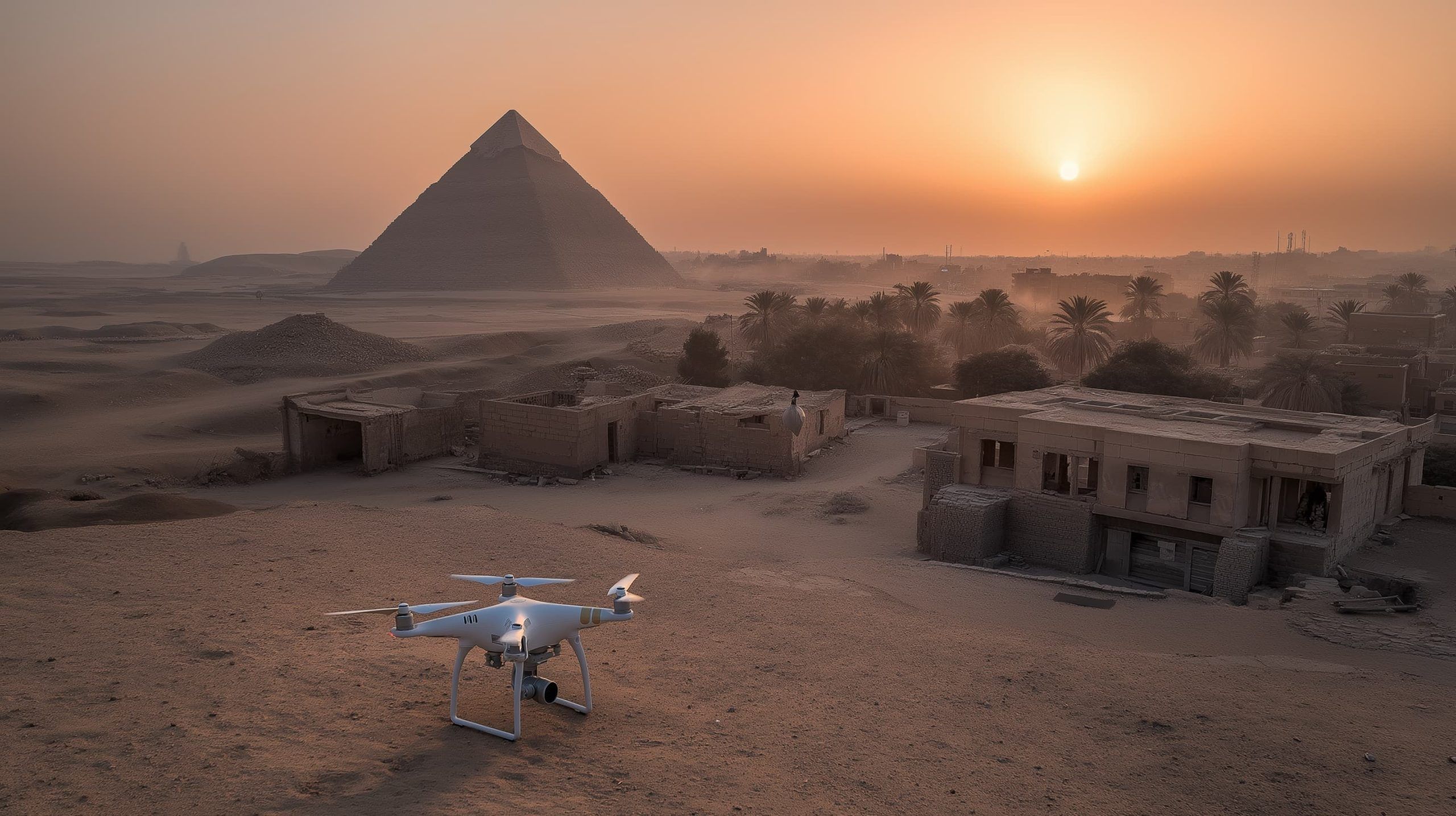- Under Law 216 of 2017, Egypt requires a Defense Ministry permit to own or operate a drone, effectively banning recreational use without authorization.
- Importing or bringing a drone into Egypt without prior approval is illegal, and customs routinely confiscate unapproved drones on entry.
- Only the smallest “toy” drones are exempt from permits, defined as ≤150 grams, no GPS, range ≤100 meters, altitude ≤5 meters, and no camera.
- Commercial drone use is theoretically allowed with a permit from the Ministry of Defense coordinated with the Egyptian Civil Aviation Authority, but approvals are rare and project-specific.
- Permit applications must come from an organized entity (economic/commercial authority, company, research institution, or sports club) and require security clearances and a declared purpose, with a decision within 30 days or deemed denied.
- Permits are valid up to three years, are typically tied to a specific project, non-transferable, and renewals require a new application several months before expiry.
- No-fly zones include a 9 km radius around airports, military/security sites, border zones, and urban areas; flights must be daylight, in good weather, within 400 feet, and within visual line of sight.
- Penalties for unauthorized drone use include 1 to 7 years in prison and fines from 5,000 to 50,000 EGP, with life imprisonment or death if used to commit terrorism; drones are confiscated.
- There is no public drone registration or civilian pilot licensing; the permit functions as both ownership authorization and operating license, with the MoD maintaining a registry.
- Enforcement is robust, with frequent customs seizures and cases of travelers detained for drone-related issues, and authorities may deploy counter-drone technologies and require government-approved partners for any permitted work.
Thinking of flying a drone in Egypt? Think again. Egypt imposes some of the world’s strictest drone regulations, effectively a near-total ban on unmanned aerial vehicles (UAVs) without special authorization. Both recreational hobbyists and commercial operators face heavy restrictions – including a requirement for military approval to even possess a drone – and violators risk severe penalties (multi-year prison sentences and hefty fines) egyptindependent.com egyptindependent.com. Below is a comprehensive breakdown of Egypt’s drone laws in 2025, covering who can (or cannot) fly, how to obtain permits, no-fly zones, and what happens if you break the rules.
Recreational Drone Usage in Egypt
Recreational drone flying is essentially prohibited in Egypt. Under a 2017 law, it is illegal for any private individual to use or even possess a drone without prior authorization from the government egyptindependent.com. In practice, casual hobby flying is not allowed – you cannot take a drone to the park or get aerial vacation photos in Egypt as you might in other countries. In fact, bringing a personal drone into Egypt is banned: travelers arriving with drones routinely have them confiscated at customs (and they are not returned) travel.state.gov smartraveller.gov.au. Egyptian authorities explicitly warn that “the use of drones, for any purpose, is illegal” and that any unapproved drones will be seized on arrival smartraveller.gov.au.
The only remote exception applies to the very simplest of toy drones. Egypt’s regulations exempt only the tiniest, least-capable drones – essentially children’s toy drones – from the permit requirement, and even those must meet extremely strict criteria:
| Exemption Criteria | Allowed Specification |
|---|---|
| Maximum Weight | ≤ 150 grams (ultralight toy) lexology.com |
| GPS / Autopilot | No GPS onboard; no autonomous flight capability lexology.com |
| Camera or Sensors | No camera (no photo/video or thermal imaging) lexology.com |
| Flight Range | Range ≤ 100 m and altitude ≤ 5 m (very limited) lexology.com |
| Payload Capacity | Cannot carry any payload whatsoever lexology.com |
Table: Extremely narrow technical criteria for “toy” drones exempt from permits in Egypt. If a drone exceeds any of the above limits (which most consumer drones do), it is not exempt and falls under the ban. In other words, virtually all camera drones, hobby-grade quadcopters, and even many advanced toys remain illegal without a permit. Egyptian law even notes that children’s remote-control aircraft are only allowed if they strictly meet these low specifications lexology.com. If not, they are treated like any other drone and forbidden.
For an ordinary recreational pilot, obtaining the required government permission is realistically not feasible. The law designates the Ministry of Defense (MoD) as the sole authority that can license drone use egyptindependent.com, and permission is rarely (if ever) granted to private hobbyists. Even the Egyptian Civil Aviation Authority (ECAA) acknowledges that flying a drone is “technically legal…if you obtain permission” from authorities, but that getting such permission is extremely difficult drone-laws.com filmfixers.co.za. As a result, Egypt is effectively a no-fly zone for recreational drones – foreign tourists and local enthusiasts alike are grounded unless they somehow secure an official permit (a highly unlikely scenario for personal use).
Commercial Drone Usage in Egypt
Commercial and business use of drones in Egypt is also highly restricted – but not entirely impossible. By law, companies, media production crews, research institutions, and even sports clubs may apply for permission to operate drones in their work lexology.com. In fact, the executive regulations explicitly contemplate drone use for “commercial, sports or research purposes,” provided a permit is obtained lexology.com. However, the barriers to approval are very high, and only well-justified, security-vetted cases stand a chance of being approved.
In general, all commercial drone operations require a permit from the Ministry of Defense, coordinated through the Civil Aviation Authority. No business can import or use drones as part of its services without this authorization egyptindependent.com. This applies to everything from aerial photography and film production to surveying, mapping, or agricultural use. Operating a drone “commercially” without a permit is illegal and would attract the same penalties as recreational use (fines and imprisonment) egyptindependent.com.
Who can apply? Only established entities (not individuals) can request a drone permit. The regulations specify that an application must come from an “economic or commercial authority, a company, a scientific (research) institution, or a sports club.” In other words, a business or organization must sponsor the request – freelance operators or tourists cannot simply apply on their own lexology.com. The application must detail a legitimate purpose for the drone use, the specific locations and timeframe of operations, and the nature of the activity (e.g. film shooting, scientific survey, etc.) lexology.com. The organization also has to list the individuals who will operate the drone (with copies of their IDs) and obtain security clearances for all personnel and the entity itself lexology.com. This involves approval from Egypt’s intelligence and security services (National Security Authority and Public Security sector) due to the obvious national security sensitivities lexology.com. Additionally, the applicant must furnish proof of its business legitimacy (commercial registration and tax card showing it is authorized to engage in the relevant activities) lexology.com. Crucially, the Ministry of Civil Aviation (ECAA) must also approve the plan as safe and compliant with aviation regulations lexology.com – the civil aviation authorities ensure any permitted drone flight won’t hazard air traffic or violate airspace rules.
All of these conditions make the permit process for commercial drones lengthy and difficult, with no guarantee of success. In fact, the default stance is rejection – by regulation, if the government does not explicitly approve within 30 days of the application, the request is considered denied lexology.com lexology.com. Permits, when granted, are time-limited licenses valid for a maximum of three years and are typically tied to the specific project or purpose described lexology.com. Operators must apply for renewal at least 3 months before expiry if they wish to continue, otherwise the permit will lapse lexology.com. There is no blanket approval for open-ended commercial drone use – each use case is scrutinized.
In practice, only a handful of commercial drone operations have been authorized in Egypt, usually those with government involvement or oversight. For example, major film productions or TV broadcasts have occasionally obtained permission to use drones, but often the workaround is to hire a locally approved drone service (sometimes one operated by military-affiliated pilots) or use helicopters for aerial shots filmfixers.co.za filmfixers.co.za. Egypt’s nascent Film Commission and professional fixers advise foreign filmmakers that drone permits are “notoriously difficult” to secure, and encourage alternate solutions filmfixers.co.za. Similarly, for industrial or research uses (like surveying desert terrain or conducting archaeological site mapping), any drone flights would need to be conducted in partnership with Egyptian authorities under a strict permit. The bottom line is that while commercial drone use is theoretically legal with a permit, in reality it is tightly controlled and rare.
Import Restrictions and Customs Regulations
Egypt’s drone restrictions begin at the border. Importing or bringing any drone into Egypt without prior approval is illegal egyptindependent.com. The 2017 drone law explicitly bans the import, trade, or manufacture of drones by any individual, company, or entity unless authorized by the Ministry of Defense egyptindependent.com. This means you cannot purchase a drone abroad and ship it to Egypt, or carry one in your luggage, without a permit. The Egyptian Customs Authority actively monitors entry points for drones and will confiscate unapproved units.
Travel advisories from multiple countries underscore this point. The U.S. State Department warns that “bringing any type of drone to Egypt…is strictly prohibited”, and any drones found “will be taken by the Egyptian government and not returned.” travel.state.gov travel.state.gov The Australian government likewise states that authorities will confiscate drones on arrival if you attempt to bring one in smartraveller.gov.au. Even if you are only transiting through Egypt, you risk the drone being seized (and potentially facing legal consequences) if it’s discovered. In short, Egypt treats drones as contraband unless you have arranged advance clearance.
For those rare cases where a drone importation is needed (say, a company with a permit bringing in specialized equipment), the process must be coordinated with authorities ahead of time. The permit application itself will include details of the drone’s specifications and its origin, and if approved, that serves as the legal basis to import it lexology.com. In fact, a customs inspection report may be required as part of the permit process to verify the drone meets any technical conditions (such as the weight or capability, in the case of a toy drone exception) lexology.com. Without this paper trail, customs officials will not release a drone. Given the stringent rules, most travelers simply should not attempt to bring a drone into Egypt. It’s best to assume it won’t clear customs and that you could even face charges for trying.
Drone Registration and Licensing Requirements
Unlike many countries, Egypt does not have a public drone registration system or a licensing program for drone pilots – because general drone operations are outlawed. Instead, the “license” in the Egyptian context is effectively the permit from the Ministry of Defense that one must obtain to legally own or operate a drone egyptindependent.com. In other words, the permit is the license. If you do not have a Defense Ministry permit, you are not allowed to have a drone at all (neither for fun nor for work). There is no separate recreational or commercial license; permission is granted on a case-by-case basis and serves as both ownership approval and operating license.
For those entities that do receive a permit, the authorities maintain strict oversight. The Ministry of Defense (through its authorized department) keeps a registry of all issued drone permits, including details on the drones and the persons or organizations authorized lexology.com. Permit holders are themselves required to maintain detailed records of their drones and operations. The executive regulations mandate that the authorized person keep two logs: one listing each drone, its specifications, and how it was acquired, and another recording every deployment or use of the drone lexology.com. These records must be available for inspection, and officials designated by the competent authority (MoD) can audit them at any time. Essentially, any drone that is legally in Egypt is tracked and accounted for in official books.
Permits (licenses) also have a defined lifecycle. As noted, a permit is typically valid for up to three years lexology.com. To continue beyond that, the holder must apply for a renewal (and again go through security vetting and reviews) several months in advance lexology.com. If a permit expires and is not renewed, or if the permittee discontinues the authorized activity, they cannot simply keep the drones in their closet – they must report and surrender the drones to the authorities or otherwise dispose of them as directed lexology.com. The law requires that within 3 days of a permit’s termination or a decision not to renew, the owner must inform the authorities of all the drones’ details so that their status can be resolved. Unauthorized sale or transfer is not allowed; if the permit holder wants to transfer ownership of a drone (say to another company), they have to get approval from the MoD for that as well.
It’s worth emphasizing that drone pilot licensing (as a skill certification) is not separately addressed in Egypt’s framework. There is no equivalent of an FAA Part 107 or “remote pilot license” because civilian drone flying isn’t open. If a person is operating under a permitted use (e.g. a military-approved drone operator for a film shoot), that person’s information would have been submitted and cleared as part of the permit application lexology.com. The authorities might also impose certain competency requirements ad hoc, but there is no published training or licensing program for civil drone pilots in Egypt. The oversight is focused on security authorization, not pilot skill – those details would presumably be handled internally by the entity operating the drone. For most readers, the key point is: unless you are part of an organization that has an official drone permit, you cannot register or license a drone in Egypt at all.
Required Permits and How to Obtain Them
Obtaining a drone permit in Egypt is a complex and challenging process, intended only for exceptional cases. Here’s an overview of how it works and what is required:
- Competent Authority – All drone permits are issued by the competent authority designated in law, which is the Ministry of Defense (Armed Forces). Applications are typically submitted to the MoD’s Operations Department of the Armed Forces, which coordinates the review with other agencies lexology.com. The Egyptian Civil Aviation Authority (ECAA) is involved in evaluating the application as well, but the ultimate license to own/use a drone comes from the Defense Ministry egyptindependent.com.
- Application Contents – A would-be operator must file a detailed application. As mentioned under commercial use, the application should come from a registered entity (company, organization, research institute, etc.) and include:
- The identity of the applicant organization (with documentation like commercial registration and tax ID) lexology.com.
- A clear statement of the purpose for the drone use, and the scope of operations (locations, times/dates or timeframe, and nature of activity) lexology.com.
- Details on the drone(s) to be used: number of drones, their technical specifications (model, weight, capabilities), and how/where they will be obtained or imported lexology.com.
- A list of the individual pilots or operators who will handle the drones, including copies of their national IDs or passports lexology.com.
- Security clearances: endorsements or approvals from Egypt’s internal security authorities, namely the National Security Agency and the Ministry of Interior’s Public Security sector, confirming that the applicant and operators do not pose a security threat lexology.com.
- An approval from the Civil Aviation Authority for the aviation safety aspects of the operations lexology.com (ensuring compliance with airspace rules, no interference with manned aircraft, etc.).
- Review Process – Once submitted, the permit application undergoes a multi-agency review. The Ministry of Defense evaluates the national security implications, the ECAA evaluates flight safety, and the intelligence/security agencies vet the backgrounds. By regulation, the decision should be made within 30 days of submission lexology.com. If the application languishes with no response beyond 30 days, it is deemed refused by default lexology.com. In practice, an applicant would likely be in communication with officials during this period to address any questions. A formal letter is issued for approved permits, and a record is entered into the official register lexology.com. If denied, typically no detailed explanation is given (especially if for security reasons).
- Permit Conditions – Any permit granted will come with conditions. Common-sense operational restrictions (discussed more below) are always in force – for example, even with a permit, you cannot fly in no-fly zones like military bases or above certain altitudes. The permit may also limit the use to certain areas or times, and it will have an expiration date (not beyond three years out) lexology.com. The permit is usually non-transferable – it’s valid only for the applicant and the specific drones listed. The authorized party must comply with record-keeping and allow inspections as described earlier. Violating any permit conditions can lead to cancellation of the permit and legal liability lexology.com.
- Renewals and Changes – To renew a permit when it nears expiry, the holder must submit a renewal request (essentially a refreshed application) at least 3 months prior to expiration lexology.com. The authorities will re-check that the operation is still acceptable. If a permit holder wants to add new drones or new uses, they likely need to amend their permit or apply anew. Also, if the purpose ends or the organization closes, the permit terminates automatically or is revoked lexology.com lexology.com. The MoD can cancel a permit at any time if it finds a violation of conditions, a change in the situation, or any new security concerns lexology.com.
Given these burdens, it’s clear why permits are rarely granted and only pursued by those with significant need (and usually, government collaboration). Tourists or casual photographers cannot obtain a drone permit in Egypt. Even professional operators should anticipate a slow and difficult process with no guarantee of success. Some anecdotal reports suggest that having the right local partners or sponsors (and a lot of patience and resources) is necessary to get the coveted approval filmfixers.co.za. The consensus advice for foreign drone operators is to assume you will not get permission, and plan accordingly (either forgo drone usage or explore alternatives like hiring a pre-approved local drone crew) filmfixers.co.za.
No-Fly Zones and Airspace Restrictions
Should you manage to secure a drone permit, be aware that large portions of Egypt’s airspace are off-limits to drones. The country’s rules (and general security practice) impose many no-fly zones and operational restrictions, including:
- Airports and Aerodromes: Drones must not fly anywhere within 9 kilometers (5.5 miles) of an airport or airfield drone-laws.com. This effectively creates a wide no-fly radius around all international and domestic airports in Egypt. Flying near runways or flight paths is strictly forbidden for safety reasons. (Even with permission to operate elsewhere, you would be barred from operating in these airport zones.)
- Military and Security Areas: Sensitive sites are strictly prohibited zones. This includes military bases, installations, barracks, and training areas, as well as police stations or security service facilities. Government buildings, diplomatic premises, and critical infrastructure are also sensitive. For example, the UK government explicitly warns not to fly drones or even take photos “near sensitive sites” or any areas that could be seen as impacting national security gov.uk. The Suez Canal is one such strategic infrastructure where photography (and by extension drone overflight) is illegal gov.uk gov.uk. Border zones (such as parts of Sinai near North Sinai and the borders with Israel, Libya, or Sudan) are militarized – drones cannot operate in these areas at all. Essentially, any area under military or strategic significance is a no-fly zone for drones.
- Urban Centers and Crowds: Drones are not allowed to fly over populated areas or large gatherings of people without special dispensation. Standard safety practice (and likely a condition from ECAA) is to never fly over crowds or congested public spaces drone-laws.com. This is both to protect privacy and to avoid injury in case of a malfunction. In Egypt’s context, a drone buzzing over a crowd could also alarm authorities, so it’s absolutely avoided. Even with a permit for, say, filming, you would need specific clearance to fly over any city areas or tourist sites with people.
- Altitude and Visual Line of Sight: Permitted drones would still be required to obey altitude and visibility restrictions. 400 feet (120 meters) AGL (Above Ground Level) is the typical maximum altitude for drone flights in line with international norms drone-laws.com, and there’s no indication Egypt would allow higher. Drones must be kept within the operator’s direct line of sight at all times (no flying beyond visual range or behind obstacles) drone-laws.com. Flying only in daylight and good weather is another standard rule – operations are allowed only during daytime with clear conditions (no night flying, no flying in heavy rain or sandstorms) drone-laws.com. These conditions ensure the operator can maintain control and avoid other aircraft.
- Photography Restrictions: Even aside from aviation rules, Egypt has strict photography and surveillance laws that affect drones. It is illegal to photograph certain sites (military areas, borders, certain government buildings, even some bridges) without permission gov.uk gov.uk. A drone with a camera inherently raises these concerns. Thus, a permit to fly will likely specify where you can film; flying a drone with a camera near prohibited locations (e.g. around military bases, embassies, or possibly near archaeological sites without clearance) would breach both the drone regulations and photography laws. Notably, all of the Pyramids, antiquities sites, and museums require special permits for any filming – drones would not be allowed over them unless explicitly authorized as part of that permit. Egyptian authorities are very sensitive about drones hovering over tourist sites or critical infrastructure.
In summary, Egypt’s default stance is that the entire country is a no-fly zone unless carved out by a specific permit. If a permit is granted, it will come with clear geographic and operational limits, and those will exclude the sensitive and high-risk areas listed above. Anyone flying a drone (with permission) must exercise extreme caution to stay within approved zones and parameters. Straying into a no-fly area, even inadvertently, could lead to immediate intervention by security forces. The airspace is so tightly controlled that one should assume any unauthorized drone will be treated as a hostile threat.
Penalties for Non-Compliance
Egypt’s penalties for illegal drone usage are severe – reflecting the authorities’ serious concerns about drones being used for espionage or terrorism. Flying or owning a drone without the required permit is a criminal offense punishable by both prison time and fines. Under Law 216 of 2017 (the drone regulation law), a person found guilty of unauthorized import, possession, or operation of a drone faces a minimum of one year and up to seven years in prison, and a fine ranging from EGP 5,000 up to EGP 50,000 (approximately USD $160 to $1,600) egyptindependent.com. The law allows for either or both penalties to be applied egyptindependent.com. For example, a court could impose a 3-year imprisonment and a 10,000-pound fine for a given violation, depending on circumstances.
Those figures (1–7 years and 5k–50k EGP fine) are the baseline penalties for standard offenses. Harsher punishments escalate for repeat or more dangerous violations. If someone repeats the offense, the penalties may be doubled lexology.com. Most dramatically, if a drone is used with malicious intent related to terrorism, the consequences skyrocket. The law specifies that using or trafficking drones “to commit acts of terrorism” can lead to life imprisonment, or even the death penalty if the drone activity results in loss of life egyptindependent.com egyptindependent.com. In other words, if authorities believe you attempted to use a drone as a weapon or to support a terrorist act, they can charge you under terrorism laws, which in Egypt carry capital punishment. (This was a major reason the law was passed – parliament was motivated by fears that drones could carry explosives or conduct surveillance for attacks egyptindependent.com.)
Regardless of the intent, all unauthorized drones are confiscated upon discovery. The law mandates the forfeiture of the equipment to the state (specifically handing it over to the military) in any conviction dailynewsegypt.com. So not only will you lose the drone, but you could also lose your freedom for several years. It’s worth noting that enforcement of drone offenses may fall under the purview of military courts; the law is enforced by the military judiciary given the national security context drone-laws.com. This underscores how seriously Egypt treats the issue – illegal drone cases might not even be handled in ordinary civilian courts.
In practical terms, what might trigger these penalties? Obviously, flying a drone without permission will attract attention quickly – Egypt has a heavy police and military presence in many areas, and a drone in the sky is likely to be reported or spotted by authorities. There have been reports of travelers detained for drone-related issues, and at a minimum, the drone gets confiscated on the spot. Possession of a drone (even if not flying) also violates the law; for example, if customs or police find a drone in your bag or car with no permit, you are liable. The severity of the punishment would depend on the context – a tourist who ignorantly brought a drone might just be confiscated and warned (or banned from the country), whereas someone suspected of nefarious use will face prosecution. The law technically requires at least one year in jail even for basic offenses lexology.com, but it’s unclear if judges have discretion to issue suspended sentences or lesser penalties in minor cases. Given the letter of the law, one should not count on leniency.
Bottom line: The penalties are intentionally intimidating to deter anyone from messing around with drones. Egyptian officials want the public to know that unauthorized drones could land you in serious legal trouble – potentially several years behind bars. This is not an exaggeration; the written law backs it up, and Western embassies explicitly highlight the up to 7-year prison term in their travel advice gov.uk. To avoid any risk, it’s best to simply leave your drone at home when visiting Egypt, and if you’re a resident, don’t attempt to acquire one unless you have gone through the official channels.
Role of Egyptian Civil Aviation Authority (ECAA) and Other Relevant Bodies
Drone regulation in Egypt involves multiple government bodies, with a clear division between national security oversight and aviation safety oversight:
- Ministry of Defense (MoD) – This is the primary authority over drones in Egypt. The MoD (and the Egyptian Armed Forces) were explicitly assigned by law to regulate the ownership and use of drones egyptindependent.com. In effect, the MoD is the licensing body; only the Defense Ministry can authorize a person or entity to possess a drone. This militarization of drone control reflects the perception of drones as potential security threats. The MoD’s Operations Department handles the permit applications, and the military has the power to approve or deny requests. The MoD also leads on enforcement – for example, military intelligence or military police may be involved in investigating illegal drone use, and as noted, cases can be referred to military courts drone-laws.com. The MoD is empowered to confiscate drones and related technology especially if tied to security threats egyptindependent.com.
- Egyptian Civil Aviation Authority (ECAA) – The ECAA is the civil regulatory agency for all aviation in Egypt, and that includes oversight of any UAV operations from an air safety and airspace management perspective. While the MoD issues the license, the ECAA’s approval is a required component of permitting lexology.com. In practice, the ECAA would set the technical rules: defining no-fly zones around airports, altitude limits, pilot responsibilities, etc. Indeed, ECAA has published general rules for drones (mirroring international standards) such as the 400 ft altitude limit, daytime-only flying, airport distance, and so forth drone-laws.com drone-laws.com. These would apply to any authorized drone flights. The ECAA ensures that a drone operation does not interfere with commercial air traffic and complies with Egypt’s air navigation regulations. It’s also likely the ECAA would maintain any airworthiness standards if larger drones were used. However, ECAA cannot approve a drone flight on its own – the security side (MoD and intelligence) must concur. Think of the ECAA’s role as making sure “if a drone is allowed, it’s flown safely and under aviation rules.” But whether it’s allowed at all is up to Defense.
- National Security Agency and Ministry of Interior – These entities aren’t mentioned in the law by name but are implicitly involved via the security approval process. The National Security Agency (Egypt’s domestic intelligence service) and the Public Security Sector of the Interior Ministry (which oversees police matters) both must vet and clear entities and individuals applying to use drones lexology.com. They will check for any terrorist links, criminal records, or other red flags. They likely also advise on whether the intended drone activity poses any internal security concerns. If either of these bodies objects to an application, it would almost certainly be denied. They are essentially the security gatekeepers in the background.
- Customs Authority – The Customs Authority under the Ministry of Finance plays a front-line role in enforcing the import ban. They inspect incoming luggage, shipments, and parcels for drones. As part of the exemption procedure for toy drones, a customs technical report is required to verify the drone’s specs lexology.com. In all other cases, customs will seize drones on sight unless the owner can produce official authorization. Customs coordinates closely with the MoD on this; any confiscated drones are handed over to the armed forces per the law dailynewsegypt.com. Shipping companies and postal services also fall under customs rules, so they too must confiscate or report any unauthorized drone shipments.
- Egyptian Police and Tourist Police – On the ground, if an unauthorized drone is being operated, local police (including the dedicated Tourist Police that patrol tourist sites) will intervene. Police have the power to arrest individuals violating the drone law and seize the equipment. Given that drones are considered a security issue, police who encounter one will likely involve State Security officers or military personnel quickly. There have been instances of police detaining tourists for flying drones or using them without permission (even inadvertently). The general public is also quite aware that drones are banned, so people may report sightings to authorities immediately.
- Judicial System – Violations of the drone law can be prosecuted under the Egyptian legal system, potentially in military courts. The law does not explicitly state all cases go to military court, but it is tied to the Defense Ministry and national security, so at minimum the MoD might have the choice of jurisdiction. The mention that the “military judiciary will enforce the laws” drone-laws.com suggests that offenders (especially non-civilians or serious cases) could be tried under military legal process, which is typically stricter. For lesser violations, it’s conceivable cases could still go through normal criminal courts with guidance from the security apparatus. In any event, the courts will impose the penalties as per the law (prison, fines, etc.), and also order the confiscation of the drone gear to the armed forces dailynewsegypt.com.
In summary, Egypt’s drone regulation is a multi-agency effort, but the Ministry of Defense is firmly in the lead. The Civil Aviation Authority contributes in its domain of air safety, and other security bodies ensure that only trusted parties (if any) get access. For anyone attempting to navigate this environment, it means you have to satisfy a whole chain of authorities, from the aviation regulators to the intelligence services and military brass. This top-heavy approach is deliberate, reflecting Egypt’s stance that drones are not a mere hobby or business tool, but a matter of national security.
Recent Changes and Enforcement Trends
What’s new in Egypt’s drone laws? Since the landmark law in 2017 (and its implementing regulations in 2018), there have been no major legislative changes loosening the restrictions on drones. As of 2025, Egypt’s regulations remain as strict as ever, if not increasingly reinforced. The government has not signaled any intent to liberalize drone usage for the general public or ordinary businesses. On the contrary, ongoing security concerns in the region continue to justify the hardline approach. For instance, in late 2023, during regional conflicts, there were incidents of unidentified drones or stray projectiles landing in Egypt’s Sinai and Red Sea areas near the Israeli border smartraveller.gov.au. These events likely underline to Egyptian authorities the potential danger of unmonitored drones, bolstering their resolve to keep a tight lid on UAVs.
Enforcement efforts have been consistently robust. Customs seizures of drones at airports and ports have been on the rise as drone popularity worldwide has grown. Egyptian officials have become well aware that travelers might carry small drones, so screening for them is now routine. Reports from travelers over recent years almost universally describe that drones are confiscated at entry if found, with no leniency. In some cases, travelers transiting through Egypt (not even exiting the airport) have had connecting flights disrupted because security intercepted a drone in their luggage. The advice from embassies and seasoned travelers is unequivocal: do not bring a drone to Egypt unless you have explicit prior permission smartraveller.gov.au.
Local media occasionally report on enforcement actions. Notably, when the drone law was passed, it was covered widely with an emphasis on the severe punishments for offenders egyptindependent.com. Since then, while there haven’t been highly publicized court cases (likely because few risk trying it), the absence of drones in Egyptian skies speaks to the law’s deterrent effect. People in Egypt know it’s forbidden. Online forums and travel blogs as of 2024–2025 are replete with warnings from users that Egypt is “a no-drone zone” and that even attempting to fly will lead to police intervention. There have been anecdotal accounts of individuals who did attempt to fly a drone (or were caught with one) being detained for questioning by security services. Typically, the matter is handled quietly unless there’s a suspected criminal intent. But one should not count on just a slap on the wrist – the legal tools to punish you harshly are in place.
One interesting development in the enforcement landscape is the growing use of counter-drone technology. While not openly discussed by Egyptian officials, many countries are adopting drone jammers and detection systems around sensitive sites. It’s reasonable to assume Egypt has deployed such measures around key locations (e.g. government buildings, airports, military bases, tourist sites like the Giza Pyramids, etc.). Thus, even if someone tried to fly a drone covertly, there’s a good chance it would be picked up and either electronically disabled or tracked down. The environment is very much “zero tolerance.”
On the flip side, the Egyptian government has shown interest in leveraging drone technology in tightly controlled ways – for example, the military and police forces have been expanding their own drone capabilities (for border surveillance, crowd monitoring, etc.). There have been joint exercises with allied countries focusing on anti-drone warfare and drone usage in combat scenarios jpost.com. This indicates that drones remain viewed through a security lens more than a commercial or hobbyist lens. Don’t expect Egypt to open up to recreational drones until they are confident the security risk is minimal – which, given the regional climate and internal security policies, could be a long way off.
In summary, as of 2025 the trend in Egypt is strict continuity: the tough drone laws from 2017 are fully in force with vigilant enforcement. All sources, from government travel advisories to local law firms, stress that Egypt’s stance is one of prohibition and punishment when it comes to unauthorized drones smartraveller.gov.au egyptindependent.com. Anyone considering operating a drone in Egypt must go through the highest levels of approval, and without that, one should refrain entirely. The combination of legal barriers and active enforcement has effectively kept Egypt’s skies drone-free except for state-sanctioned uses. For the foreseeable future, Egypt will remain one of the least permissive jurisdictions in the world for drone enthusiasts – a necessary trade-off, in the government’s view, to ensure security and public safety in a volatile region.
Sources:
- Egypt Independent – “New law prohibits drone use without Defense Ministry approval” (Dec 2017) egyptindependent.com egyptindependent.com
- UK Government Foreign Travel Advice – “Safety and security – Drones” (Egypt section) gov.uk
- U.S. Department of State – Egypt International Travel Information (Drones entry) travel.state.gov
- Lexology (Youssry Saleh & Partners) – “Legal controls for the use of ‘Drones’ in Egypt” (Jan 2022) lexology.com lexology.com
- Australian Smartraveller – Egypt Travel Advice (Drone and communications equipment) smartraveller.gov.au
- Drone-laws.com – “Egypt Drone Laws (Updated May 17, 2025)” drone-laws.com drone-laws.com (summary of regulations and 2017 law)
- Daily News Egypt – “Ministry of Defence to regulate possession, use of drones” (Dec 2017) dailynewsegypt.com dailynewsegypt.com (reporting on the law’s ratification and scope)









